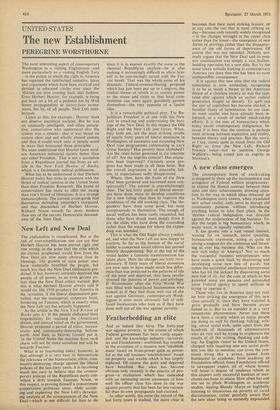New Left and New Deal
The explanation is complicated. But at the risk of over-simplification one can say that Herbert Hoover has been proved right and FOR wrong, in the sense that the evils which the former prophesied would flow from the New Deal are now more obvious than its blessings. The growth of state power may have materially benefited the people, but much less than the New Deal enthusiasts pre- dicted. It has, however, certainly deprived the people of all power, to an even greater ex- tent than the New Deal critics warned. But this is what Herbert Hoover always said it would do. His 1930 prophecy for America in the 'seventies, if the liberal dispensation pre- vailed, was the managerial, corporate State, bordering on Fascism, which is exactly what the New Left say has actually happened.
As the article in the New York Review of Books puts it: If the people abdicated their responsibility for realising the (American) dream, and instead relied on the government, Hoover projected a period of elitist, bureau- cratic and community-destroying hell-on- earth. And then, as Hoover himself put it, 'in the United States the reaction from such chaos will not be more socialism but will be towards Fascism'.
What is so fascinating today, however, is that although it is very easy to demonstrate the relevance of the bureaucratic, elitist, com- munity-destroying charge against the liberal policies of the last forty years, it is becoming much less easy to believe that the contem- porary policies of the Republican party con- stitute a drift towards Fascism. Nixon, in this respect, is proving himself a consummate conservative politician since, while accept- ing and exploiting the New Left's devastat- ing analysis of the consequences of the New Deal—which is not difficult for him to do since it is in essence exactly the same as the classical Republican analysis—he is also making it increasingly difficult to allow him- self to be convincingly tarred with the Fas- cist brush. That was the whole point of his dramatic Federal-revenue-sharing proposal which has just been put up to Congress, the central theme of which is to restore power to the states and cities so that local com- munities can once again genuinely govern themselves—the very opposite of a fascist idea.
It is a remarkable political ploy. The Re- publican President is at one with the New Left in attacking and undermining the heri- tage of the New Deal. In this respect the Old Right and the New Left join forces. What, they both ask, are the most striking results of nearly forty years of liberal dominion in Washington, of successive and mounting New Deal type programmes culminating in LW'S Great Society? Has poverty been abolished? Are the cities better governed in the interests of all? Are the negroes content? Has educa- tion been improved? Certainly some pro- gress has been made in all these fields. But the overall impression is of miserable fail- ure, of expectations sadly disappointed.
Where, then, have the fruits of the New Deal been garnered and harvested most con- spicuously? The answer is overwhelmingly clear. The last forty years of liberal domin- ion have done more to develop conditions for a new ruling class than to improve the conditions of the old working class. The 'do- gooders' have done some good, but most conspicuously to themselves. The trough of social welfare has been vastly expanded, but those who have drunk most deeply from it are the elites who have done the expanding rather than the masses for whom the expan- ding was intended.
This is what the Old Right always r redict- ed, and what the New Left are now happy to confirm. So far as the bottom of the social ladder is concerned social reform has proved bitterly disappointing. But at the top of the social ladder a fantastic transformation has taken place. Here the changes are truly revo- lutionary. If forty years of liberal dominion are now seen to have made much less differ- ence than was predicted to the patterns of life of the poor and deprived, they have revolu- tionised the patterns of power and privilege. If Westminster after the First World War was filled with hard-faced businessmen who looked as if they had done well out of the war against Germany, contemporary Wash- ington is even more obviously full of soft- faced bureaucrats who look as if they have done well out of the war against poverty.










































 Previous page
Previous page